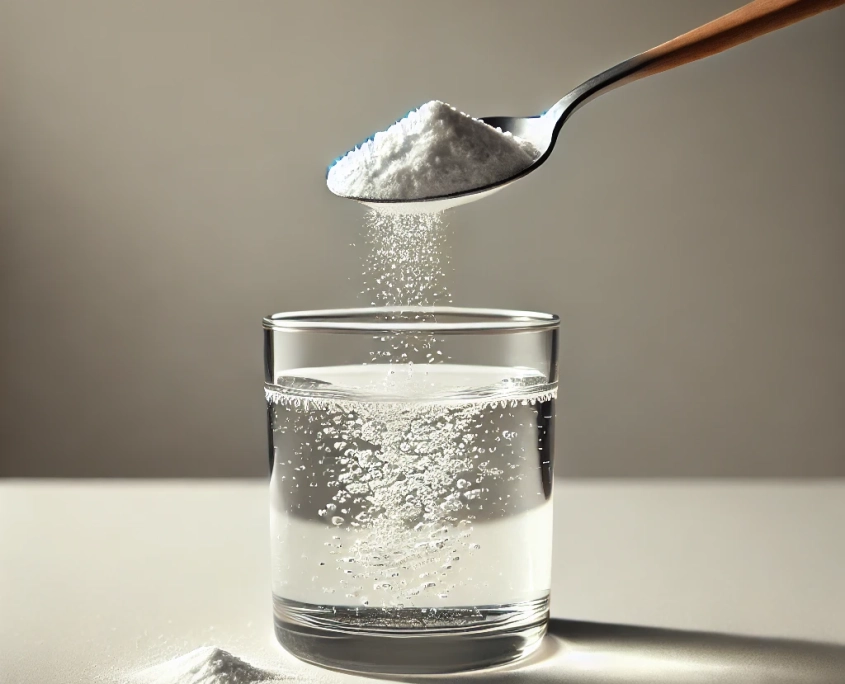The Benefits of Baking Soda for Neutralizing Systemic Acidity

Systemic acidity is a condition where the body’s pH levels become imbalanced, often leading to various health issues such as gout, kidney stones, muscle fatigue, and digestive problems.
Baking soda, a common household item, has been used for centuries to alleviate acidity-related symptoms. This paper investigates the efficacy of baking soda in neutralizing different acids and improving overall health.
Mechanism of Action
Baking soda is an alkaline compound that, when ingested, dissociates into sodium and bicarbonate ions. The bicarbonate ions act as a buffer, neutralizing excess hydrogen ions responsible for acidity. This buffering action helps maintain the body’s pH balance, crucial for normal cellular function and overall health.
Health Benefits
- Reduction of Uric Acid: High levels of uric acid can lead to gout and kidney stones. Baking soda helps neutralize uric acid, making it easier for the kidneys to excrete it, thereby reducing the risk of gout attacks and kidney stones.
- Buffering Lactic Acid: During intense exercise, lactic acid builds up in muscles, causing fatigue and soreness. Baking soda buffers lactic acid, delaying fatigue and improving athletic performance by maintaining a more neutral pH in muscle tissues.
- Neutralizing Stomach Acid: Excess stomach acid can cause heartburn and indigestion. Baking soda neutralizes hydrochloric acid in the stomach, providing relief from these symptoms.
- Overall Impact on Systemic Acidity: By neutralizing various acids in the body, baking soda helps maintain systemic pH balance, reducing stress levels, improving sleep, and supporting overall health.
Scientific Evidence
Several studies support the use of baking soda for reducing systemic acidity:
- A study published in Complementary Therapies in Clinical Practice showed that sodium bicarbonate bathing significantly reduced salivary amylase levels, indicating reduced stress.
- Another study demonstrated that a modestly alkaline diet, including sodium bicarbonate, significantly reduced cortisol secretion compared to a more acidic diet.
These findings suggest that baking soda can effectively manage acidity-related conditions and improve overall well-being.
Clinical Applications
Baking soda is used in clinical settings to manage conditions such as chronic kidney disease and metabolic acidosis. It can slow the progression of kidney disease and improve renal function by neutralizing systemic acidity. Additionally, its anti-inflammatory properties can benefit individuals with conditions like rheumatoid arthritis.
Potential Risks and Side Effects
While baking soda offers numerous benefits, it is essential to use it judiciously. Potential risks include:
- Alkalosis: Excessive intake of baking soda can lead to alkalosis, a condition where the body becomes too alkaline.
- Increased Sodium Levels: Baking soda contains sodium, which can be problematic for individuals with hypertension or heart disease.
- Gastrointestinal Discomfort: Overuse may cause bloating, gas, and discomfort.
Practical Applications and Dosage Recommendations
For reducing acidity, a common dosage is 1/4 to 1/2 teaspoon of baking soda dissolved in a glass of water, taken once or twice a day.
It can also be added to baths and foot baths to provide a mild alkalizing effect.
Baking soda is a versatile and accessible remedy for neutralizing systemic acidity, offering benefits such as reduced uric acid levels, improved exercise performance, and relief from heartburn. By maintaining a balanced pH, it supports overall health and well-being. Future research should explore the long-term effects of baking soda use and its impact on different populations.
